Is Portugal Safe For Solo Female Travellers? An Honest Guide
So, is Portugal safe for solo female travellers? In this guide, we’re going to talk about just that. Because when you’re planning a trip as a solo female traveller, safety is never just an afterthought. It’s that little voice in the back of your mind that’s always wondering Will I feel safe walking home after dark? What if something goes wrong? Am I going to be stared at just for being alone?
I get it. I’ve been there. And after exploring Portugal as a solo female traveller myself – from busy Lisbon streets to sleepy inland towns – I’ve got a lot of opinions!
This guide is for you if you’re dreaming of a trip filled with blue-tiled buildings, the sound of the ocean and pastel de nata (duh!), but also want to know what it really feels like to travel to Portugal on your own as a woman.
And not just stats or click-bait headlines, either. But the real, on the ground experience. Things like how locals will treat you, what public transport is actually like, the vibes at night, and the little things no one tells you until it’s too late (like which tram pickpockets love.)
In this blog post, I’ll walk you through it all. No fear-mongering or glossing over hard truths, I promise. Just all of the honest advice I wish someone had told me before my first solo trip to Portugal!
Disclaimer: Some of the links on this blog are affiliate links. That means if you click on one and make a purchase, I may earn a small commission – at no extra cost to you. I only recommend products, places and services I genuinely love and use on my own solo travels. Thank you for supporting my adventures so I can continue to provide free content on this blog! 💛
Is Portugal Safe for Solo Female Travellers?
Want a short answer? Yes. In fact, Portugal is generally considered to be one of the safest countries in Europe for solo female travellers! But in this guide, we’re going to go a whole lot deeper than that basic, surface-level answer.
If you’re anything like me before I travelled to Portugal (or anywhere!), you’re really asking things like: Will I feel safe walking alone in Portugal? How will local people treat me? Can I relax and enjoy myself without having to constantly stress about safety? And again, my honest answer to all of those questions is a tentative yes, but as with all solo female travel, there are a few things to keep in mind before your trip.
When I travelled solo around Portugal – from Lisbon to Evora, Porto to Sintra – I felt incredibly at ease most of the time. There’s a genuinely calm and relaxed vibe in Portugal, and that shows up in the way people treat you.
And if you’re someone who finds comfort in data? (Because same!) Numbeo’s safety index backs up what I felt on the ground: crime levels in Portugal are considered to be low, and the rate of violent crime is even lower. And that’s exactly why so many solo female travellers choose Portugal for their first trip alone!
But, as I mentioned a second ago, no country, city or town is perfect. And, despite popular misconception, Portugal is no different. There are still scams to be aware of, cultures to stay respectful of and busy touristy areas that do attract pickpockets.
Also, like anywhere, your experience will be shaped by where you go, how you travel, and how prepared you are. That’s exactly why I wrote this guide – to give you the real, balanced view I wish I’d had when I first googled is Portugal safe for solo female travellers? a few years ago.
Katie’s Top Tip: Don’t just take that generic, regularly pushed “it’s safe” message at face value. Even in the “safest” countries in the world, it’s still so important to read up, stay aware and trust your gut. I always say on this blog that confidence as a solo female traveller comes from knowledge, and this guide is here to give you every last bit of Portugal knowledge I have!
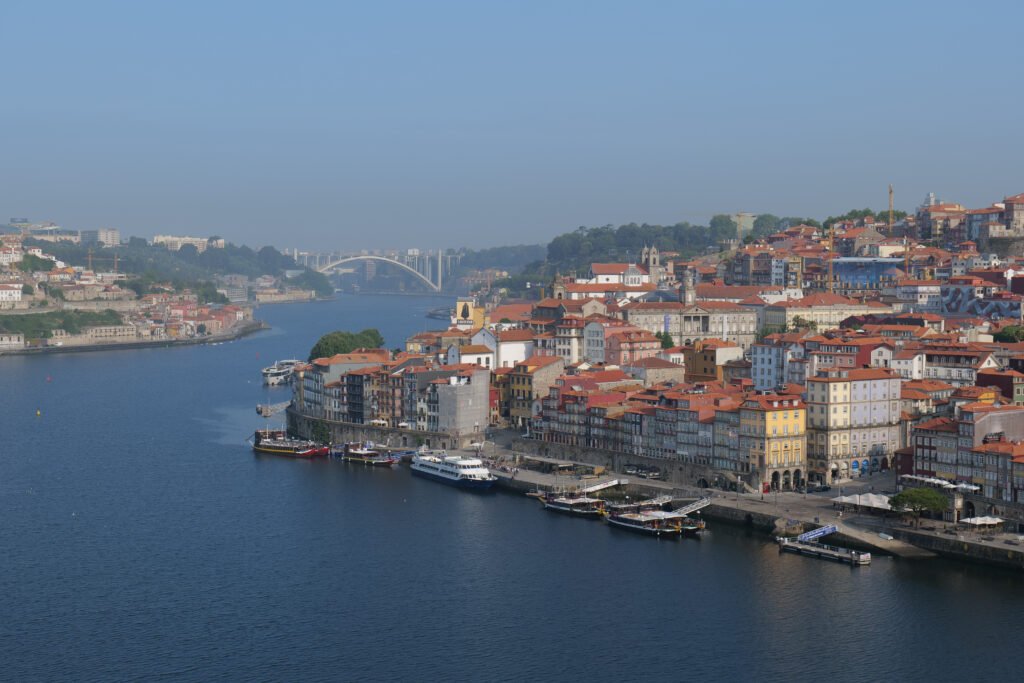
Understanding Portugal’s Culture
Local people in Portugal tend to be laid-back, polite and incredibly proud of their country. There’s a real feeling of community, especially in the smaller, inland towns. However it is important to recognise that local culture is also quite reserved, with locals keeping themselves to themselves.
As a result, locals are unlikely to strike up conversations with tourists unless prompted, but don’t mistake that for rudeness or them being standoffish. If you’re respectful and make an effort (for example saying obrigada, which means thank you, when someone helps you,) you’ll usually be met with kindness and people willing to help if you need it.
Portugal is also a fairly conservative society. Loud, drunk or antisocial behaviour will feel out of place here, even in the capital Lisbon, and it isn’t at all appreciated by locals. This doesn’t mean you can’t have a good time and enjoy the nightlife, but remember to be respectful – especially when walking home via residential areas.
In my experience as a solo female traveller in Europe, blending in with local cultures will always make you feel more confident and help you avoid unwanted attention. So, understanding Portugal’s slower pace, respecting locals’ personal space and keeping noise to a minimum at night will help you feel more at ease with your surroundings and less like a tourist.
Important Edit for 2025: Recently, Lisbon has seen some anti–mass tourism protests, similar to what’s happened in other major European cities. At this point, these protests haven’t affected solo female travel safety in Portugal, but it is an important reminder that locals feel overwhelmed by crowds and over tourism. Showing awareness as you travel and opting for less touristy areas or off-peak times will help you show respect at this time.
Katie’s Top Tip: Want to connect with locals? A great way to strike up conversation is to ask for local recommendations. People are usually more than happy to help and share their knowledge, especially when you lead with curiosity and respect. Asking locals who work in hospitality, like tour guides or hotel receptionists is great for this!
Attitudes Towards Women in Portugal
In general, Portugal is a very respectful and safe country for women. Street harassment is rare compared to many other countries in Europe and catcalling is not part of the cultural norm. I’ve walked around Lisbon and Porto alone many times, at all times of day, and never felt like I had to cross the street or pretend to be on the phone just to get some peace. Who else has done that?!
However, as with anywhere, you might still get the occasional stare or awkward comment, especially in tourist areas. These instances were, in my experience, from fellow tourists rather than local people. Plus, as I mentioned, it is very rare.
Portugal is also very popular for solo female travel in Europe and so local people are used to seeing women travelling alone. In my experience, you won’t be constantly asked why you’re travelling alone, the way you might be in some other parts of the world. In smaller towns and villages, particularly inland, you may experience more local curiosity than in the cities, but it’s rarely intrusive.
Katie’s Top Tip: If someone does make you uncomfortable, saying a firm “no” while holding eye contact usually does the trick. Keep your boundaries clear and walk away with confidence. Remember, you don’t owe anyone anything.
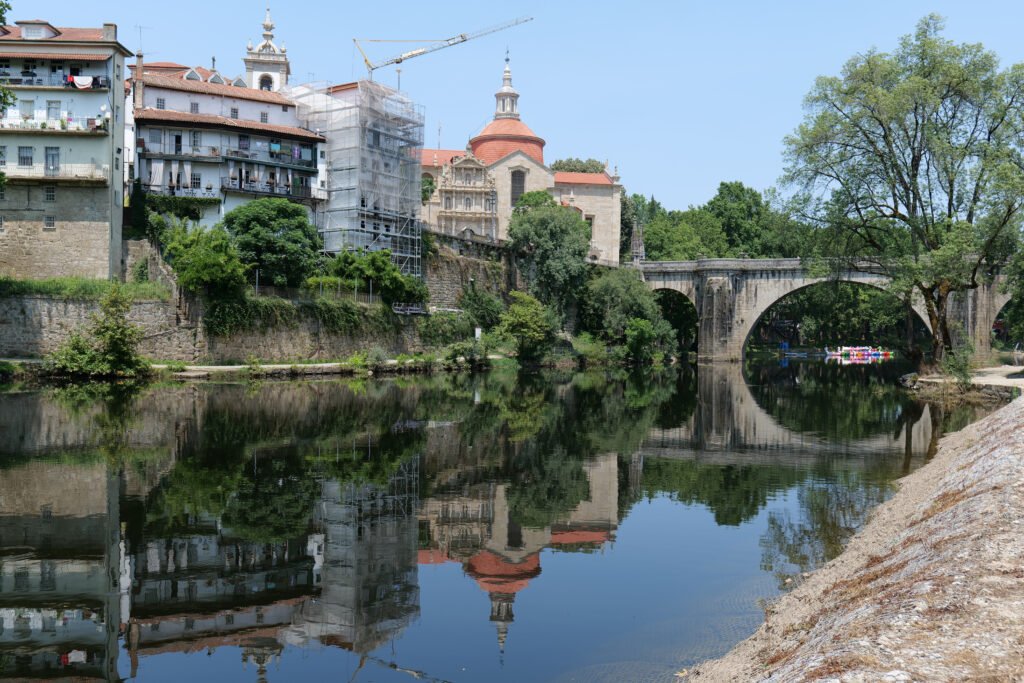
How to Dress in Portugal
Portugal is modern and relaxed when it comes to fashion, but there’s a definite trend towards more put-together outfits, especially in the cities. Think simple, neutral and stylish, but comfortable.
And no, this absolutely doesn’t mean you need to cover up, lose your personal style or become a fashion guru overnight (!), but I did personally feel more comfortable dressing modestly-ish in Lisbon and Porto.
During my June trip to Portugal, I wore a mix of midi dresses, cute short-sleeve tops, linen trousers and trainers or sandals, and never felt out of place. I also always brought a lightweight scarf in my day bag for cooler evenings or spontaneous visits to religious sites.
At religious sites in particular, like Fatima, dressing more conservatively will help you feel more respectful and avoid stares. In this case, opt for an outfit that covers both your knees and shoulders.
Katie’s Top Tip: A light scarf is the ultimate solo female travel accessory! You can use it to cover up for churches, as a beach wrap or even as a makeshift blanket if you get cold!
Portugal Crime Rates
Portugal consistently ranks as one of the safest countries in the world, currently sitting in 7th place on the Global Peace Index – and the crime stats back that up.
For example, according to Numbeo’s latest data, the rate of violent crime in Portugal is considered low.
Most crimes that do occur tend to be non-violent, petty crimes like pickpocketing or scams, especially in touristy areas like Lisbon’s trams, Porto’s Ribeira district and around major transport hubs.
So, while is Portugal safe for tourists? is a common concern, the truth is that crime rates here are significantly lower than in a lot of other European countries.
As I mentioned, petty theft does happen, particularly in crowded areas, but it’s less about being paranoid or stressed about that and more about staying street-smart.
Crossbody bags, taking advantage of your hotel safe (if you have one), and keeping your valuables zipped and out of sight are all top solo female travel safety tips for any city.
Katie’s Top Tip: Don’t rely on back pockets or open bags like totes. Instead, invest in a secure crossbody bag, and always double check that your valuables are zipped up and in front of your body before you leave your accommodation.
Risk of Theft in Portugal
Theft, in particular petty theft, can happen in Portugal, especially in big cities and crowded areas like tourist attractions, train stations or popular markets. And while it’s not something you need to be scared of or paranoid about, it is something every solo female traveller should stay smart about.
It’s also important to say that tourist theft in Portugal is rarely aggressive – more a sneaky grab-and-run than a confrontation – but it can still ruin your trip.
I’ve noticed from myself and others that, as solo female travellers, we tend to be more alert already (hello, conditioned sixth sense!) but extra awareness still goes a long way.
In most cases, theft in Portugal looks like someone swiping your phone off a café or restaurant table while you’re distracted or a pickpocket swiping your purse from an open tote bag or backpack.
And, on average, Lisbon and Porto see the most incidents of theft, but that’s just because they are cities and have more tourists, not because they’re unsafe.
Katie’s Top Tip: Carry your valuables in a zipped crossbody bag, in front of your body. But don’t carry all valuables in the same bag, just in case. Instead, split cards and cash between locations. Also, never hang your bag on the back of your chair at cafés or restaurants. Instead, keep it on your lap or loop the strap around your leg. This makes you a much harder target for opportunistic thieves.
Risk of Terrorism in Portugal
When it comes to terrorism, Portugal is one of the safer countries in Europe, and there have been no recent attacks.
However, in 2023, the government did increase the national threat level from moderate to significant. This means that attacks cannot be ruled out, and you should remain vigilant.
But you also don’t need to be on edge or paranoid about this during your trip – just stay aware of your surroundings (which is important for solo female travellers in general.)
And if you’re wondering whether it safe to travel to Portugal right now with everything going on in the world, I get it. We are living through an increasingly scary and unpredictable time and it’s normal to feel cautious. But you should know that Portugal has tightened security measures in recent years, and public spaces like city centres, airports and transport hubs have a strong police presence and are well monitored.
While no country can guarantee zero risk, Portugal is seen by many as a peaceful and politically stable place to visit.
Katie’s Top Tip: Check your home country’s Portugal travel advice page before your trip. It’s a good habit to build and helps keep you reliably informed without getting overwhelmed by those clickbait, fear-mongering headlines.
Risk of Violent Crime in Portugal
Violent crime against tourists in Portugal is very rare. Portugal consistently ranks as one of the safest countries in Europe, with low homicide rates and minimal gun violence. As a result, most of the time, you’ll feel completely safe walking around, even alone at night. But, of course, as I keep saying, no place is perfect.
Typically, alcohol-fuelled fights can happen near clubs or bars (especially late at night), and like anywhere, it’s always best to avoid walking unlit or isolated backstreets after dark, particularly in unfamiliar neighbourhoods.
Katie’s Top Tip: If you ever feel uncomfortable, don’t hesitate to pop into a café, hotel lobby or shop to regroup. Locals are usually more than happy to help, and stepping into a public space will help you feel safer and in control.
Risk of Harassment in Portugal
No sugar-coating here: street harassment can, sadly, happen, but it is generally mild compared to many other places. Catcalling tends to be more common in certain, more nightlife heavy areas of Lisbon and Porto. And when it happens it’s usually younger men (often tourists in groups) trying to get a reaction. It’s uncomfortable, but not usually threatening to safety.
Just remember that you don’t owe anyone your time, attention or energy. If someone makes you feel uncomfortable, don’t engage with them. Just keep walking or head into a busier space or shop/restaurant/hotel until you feel safe to continue.
If harassment does happen, I want you to know that it’s completely okay to feel rattled, sad, upset, angry… all of the emotions. You’re not being dramatic. You’re just doing your best to stay safe and, when travelling alone, that can feel very overwhelming. Please don’t bottle up the emotions these kinds of incidents can bring or laugh them off. Instead, talk to someone you trust when you feel safe to do so. Harassment is a very real experience to go through and is never okay.
Katie’s Top Tip: If someone crosses a line, trust yourself and don’t hesitate to create space or seek help. You can also say no firmly, or ignore it completely. Confidence is your best line of defence here (even if you’re not feeling it) and you absolutely have every right to use it – without apology or politeness. You don’t owe anyone that if they’re making you feel uncomfortable.
Risk of Pickpocketing in Portugal
Pickpocketing is probably the most common safety issue travellers face in Portugal, but again it’s more about being travel smart than being paranoid. You’ll want to be extra aware around popular tourist attractions like the tram 28 in Lisbon, Sao Bento station in Porto, or during popular markets or events when people are packed in close.
Pickpockets here are professionals, and they work fast.
Pickpockets in Portugal tend to target distracted tourists and aren’t typically motivated by gender. A typical tourist who looks distracted might be doing one (or more) of these things:
- Holding a paper map
- Using their phone on the go
- Leaving their bag on the pavement to take photos
- Showing valuables in easy-to-reach spots (like a phone sticking out of a back pocket)
While most pickpocketing incidents are opportunistic and not targeted, solo travellers can be seen as easier targets simply because they’re alone. As a result, avoiding those distractions listed above and staying alert and aware of your surroundings is the best way to avoid trouble.
Katie’s Top Tip: Use an anti-theft backpack or, preferably, a crossbody bag with zips. You could also carry a fake wallet with a few coins and fake cards in it, just in case. That way, your real valuables stay zipped up close to your body.
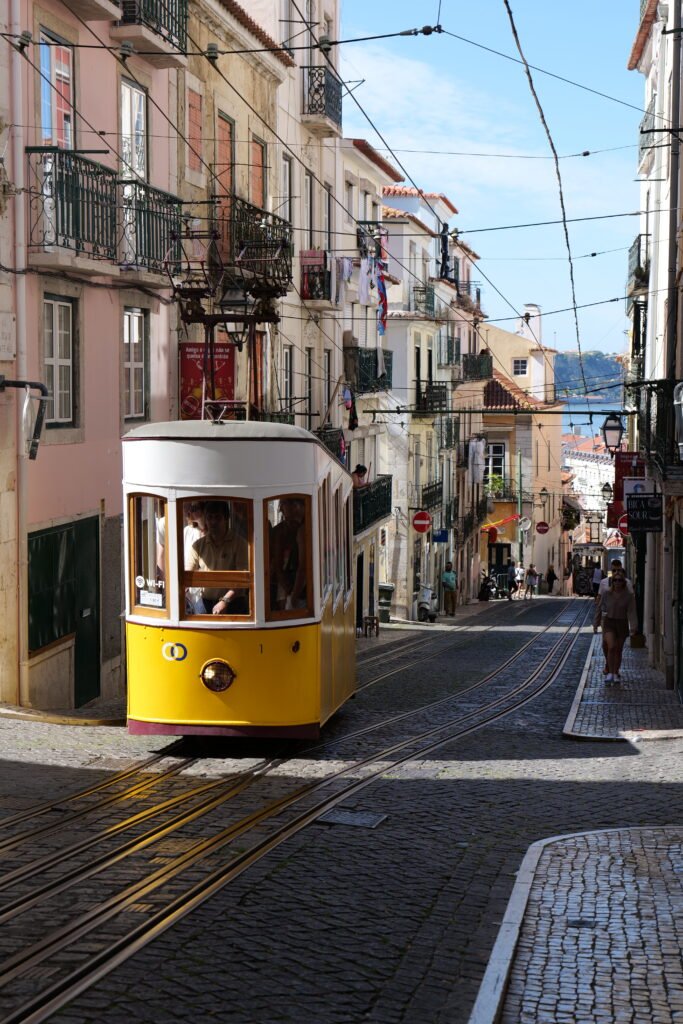
Risk of Scams in Portugal
Scams in Portugal are generally low-stakes and non-confrontational, but they’re still frustrating to deal with. The most common scams in Portugal include:
- Dodgy taxi drivers refusing to use the meter, adding unfair luggage surcharges or over-inflating fares for tourists
- Overly-friendly locals trying to give you something and then demand money for it
- Sellers offering fake (or overpriced) tours or attractions on the street
- Fake petitions or donation requests
A common tourist trap in Portugal is restaurants with no prices listed, or restaurants that offer extras like bread, cheese, olives or water that you didn’t order – without making it clear you will be charged for them. In most cases, this can be avoided by checking reviews on Google Maps before committing.
As a solo traveller, some scammers may see you as more approachable. But just remember this: you don’t need to be polite or engage with someone who’s trying to take advantage of you. It is totally okay to say no firmly, just walk away, or even pretend not to understand the language if someone’s being persistent.
Katie’s Top Tip: Always check restaurant reviews before sitting down, keep a trusted local taxi company in your phone to avoid scammy drivers, and if someone tries to hand you something on the street: just don’t take it.
Portugal’s Emergency Number
Portugal (and Europe’s) emergency number is 112. This is the one number you need to call for police, fire or ambulance services (a bit like 999 in the UK or 911 in the USA). It’s free to call from any phone, and the operator will speak English.
I know this isn’t the kind of info you want to need, but having it saved in your notes can make a huge difference in the rare case something does go wrong.
Katie’s Top Tip: Save 112 to your phone contacts so you’re not fumbling to Google it in a panic. Also make sure you have your accommodation’s address and any emergency contacts written down on paper in case your phone dies or you lose signal.
The Safest Places to Visit in Portugal
If you’re planning your Portugal solo female travel itinerary and wondering where you’ll feel the safest, the good news is you’ve got plenty of options! Portugal is generally very safe for tourists, but some places do stand out for feeling ultra relaxed, being easily walkable and having a strong solo travel community.
We’ll talk about Lisbon and Porto in just a second, but here are some of my other favourite (smaller) destinations in Portugal that also feel very safe:
Cascais is my favourite laid-back seaside town, and it’s just 40 minutes from Lisbon. It has a calmer vibe than the capital, offers easy access to popular Sintra and the streets are well-lit and feel safe to walk.
If you’re after somewhere inland, with a bit of history to learn, Evora (in Portugal’s Alentejo region) is stunning, with fewer crowds, breath-taking ruins and loads of local charm!
Tiny Amarante feels like a secret I’m not sure I want to share! It’s nestled on the Tamega river, not far from bustling Porto, and yet feels like a whole world away. The vibe is relaxed, it’s very local with not many tourists and you can sit by the river and admire the view for hours!
P.S. I also love Coimbra, Sintra, Braga, Guimaraes, Nazare, Obidos and Sesimbra. There are just too many safe and beautiful places to mention them all here, but I do have a full guide to the best places to visit in Portugal as a solo female traveller.
Katie’s Top Tip: When planning your route through Portugal, try to balance busy cities like Lisbon or Porto with at least one smaller town to truly experience the beauty of this country!
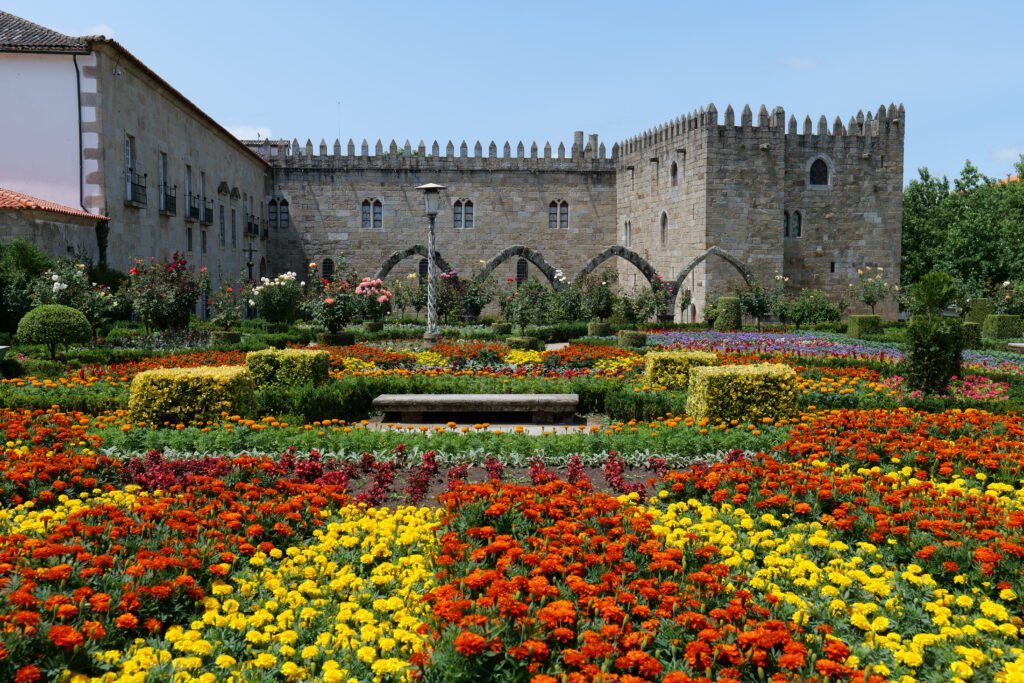
Places to Avoid in Portugal
While Portugal is a safe country overall, there are a few places where you’ll want to stay extra alert, especially as a solo female traveller.
In Lisbon, neighbourhoods like Anjos, Martim Moniz, Intendente and Chelas after dark can feel a bit sketchy, particularly if you’re walking alone or just after the bars close. These spots have more reports of pickpocketing, rowdy nightlife, drug dealing and the occasional violent altercation. This is especially true in low-season when streets are quieter.
In Porto, you will want to avoid Miragaia, Pinheiro Torres, Aleixo and Cerco after dark, as they have slightly higher crime rates and are less well-lit at night. Also, be cautious around Ribeira and Baixa at night. While these neighbourhoods are popular, busy and generally safe, there is a nightlife culture that can attract pickpockets and unwanted attention.
It’s important to say that most of these places are absolutely fine during the day and often full of tourists, but they’re not ideal for late-night walks. So if you’re wondering about the places to avoid in Portugal, it’s mostly just about knowing which areas change vibe after sunset.
Katie’s Top Tip: Use Google Street View when booking accommodation to check out the neighbourhood ahead of time. If the area looks dark, deserted or full of boarded-up buildings, trust that instinct and look elsewhere. You deserve to feel safe coming home after dinner or drinks.
Is Lisbon Safe for Solo Female Travellers?
Yes – Lisbon is safe for solo female travellers, but there are, of course, a few caveats. It’s a capital city, so like anywhere, it comes with the usual big-city mix of good and not-so-good in terms of safety.
During the day, Lisbon is wonderful to explore – incredibly walkable and the streets are buzzing with both locals and tourists. But at night, especially around nightlife establishments and in quieter neighbourhoods, you’ll want to stay alert or even avoid entirely. This just depends on your level of comfort at night and whether you want to party during your trip.
Lisbon is known for its hills, tiles, and trams, but those stunning cobbled streets can feel quite different – even isolated – after dark. So if you’re asking whether Lisbon is safe at night, my answer would be mostly yes, but avoid shortcuts through alleyways or poorly lit side streets.
To stay safe in Lisbon, stick to the main, busy roads and consider using a trusted taxi service late at night, especially if you’ve had a drink or are feeling tired. I’ve walked around Lisbon solo at night many times and have always felt safe and comfortable when I followed my gut and stayed aware of my surroundings
Katie’s Top Tip: Save the number of a few trusted taxi companies before you arrive to avoid having to walk back in the dark alone or potentially pick up a dodgy service.
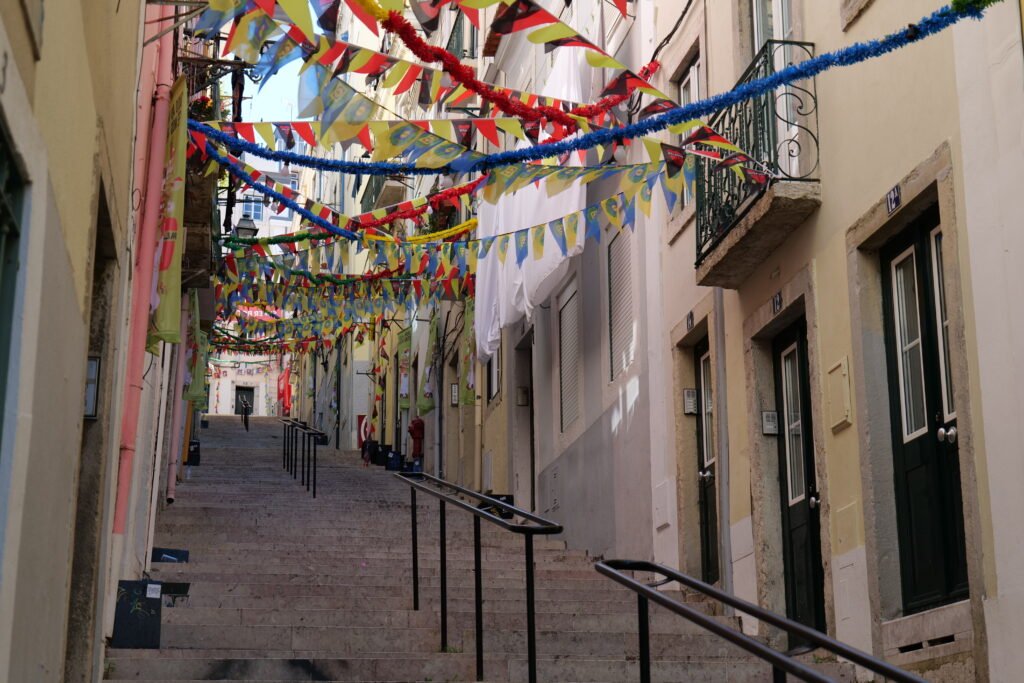
Is Porto Safe for Solo Female Travellers?
Just like Lisbon, Porto is safe for solo female travellers, and has a slightly calmer feel. The city is smaller, more compact and has a slower pace.
During the day, the riverside area of Ribeira and the charming streets surrounding it are all full of life and feel safe to explore alone. The people are friendly, the food is amazing and the views are genuinely incredible!
At night, some of the streets can feel a bit uncomfortable to walk alone because they’re quieter and less well-lit. As always, trust your gut instincts and don’t be afraid to take the long way or call for a taxi if that feels more comfortable for you.
Pickpocketing can be an issue in Porto too, especially near the Dom Luis I bridge and on crowded public transport.
Katie’s Top Tip: If you’re staying in Porto’s historic centre, try booking accommodation that’s close to the riverside. It’s central, well-lit and always full of other travellers, which makes it perfect for meeting people if that’s your thing, or just feeling that extra bit of comfort walking around after dark.
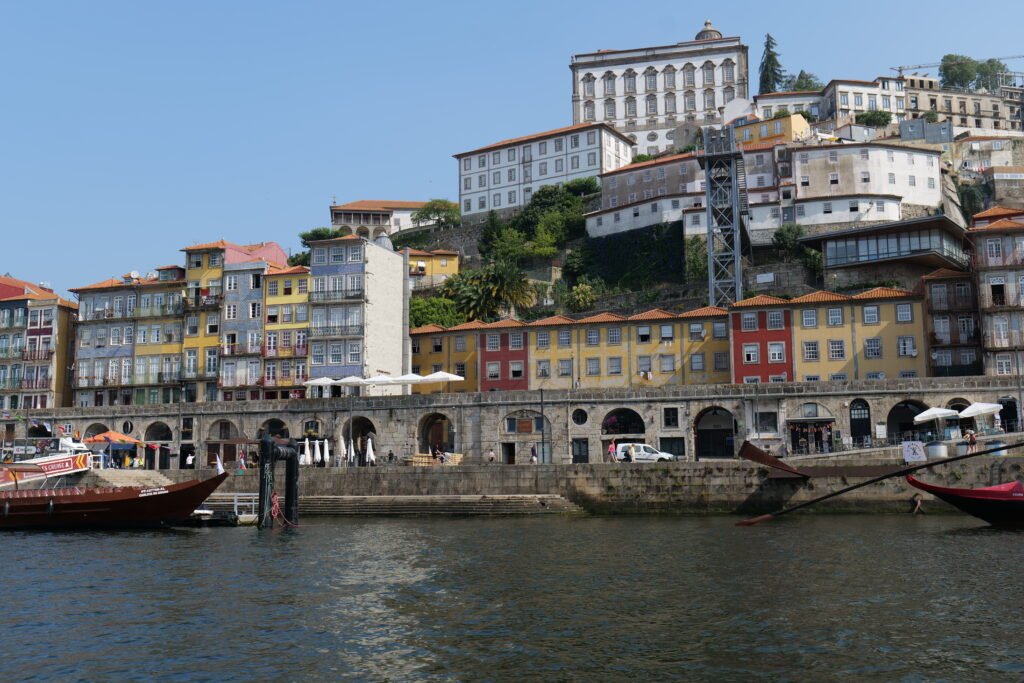
Is Portugal Safe at Night?
Mostly, yes. Portugal is known for being one of the safest countries in Europe, and walking around at night in cities like Lisbon, Porto and Coimbra is generally low-risk.
Having said that, this depends a lot on what neighbourhood you’re in, what time it is and how confident you feel.
Statistically, Portugal scores high for people feeling safe walking alone at night, which is a strong rating compared to a lot of other countries in Europe.
And from experience, I’d say those numbers reflect reality. I walked back to my accommodation alone after dark, in both Lisbon and Porto, plenty of times and always felt safe when I stuck to well-lit, busy streets.
Especially in touristy areas, you’ll see people dining outdoors until late, especially in summer when it stays light longer.
But late at night, especially after 11pm or around heavy nightlife areas, things can quickly shift. Public transport becomes spottier, streets get quieter and you’ll more than likely come across drunk groups that make you feel uncomfortable.
So if you’re wondering whether Portugal is safe for solo female travel at night, remember this: stay in well-lit, populated areas and don’t be afraid to grab a taxi if anything feels off or if you feel tired.
Katie’s Top Tip: Always have a backup way to get home – whether that’s a downloaded, safe route to walk, a saved taxi number, or even a friendly person at your accommodation you can call. Feeling safe at night almost always comes down to feeling like you have a plan, so make sure you have a few options in place.
Nightlife in Portugal
Portugal’s nightlife is vibrant, fun and laid-back, which makes it a great country to enjoy a night out, even if you’re travelling solo! From rooftop lounges in Lisbon and cosy wine bars in Porto, there’s something for every type of traveller.
Portugal is also considered to be generally very safe for women enjoying nightlife, especially in touristy areas where it’s common to see other travellers, solo females and even locals out and about.
However, nightlife safety still comes down to making smart choices, so stick to well-known venues with good reviews, keep your drink in sight at all times, and trust your gut if a place (or person) gives you an off feeling.
Grabbing a reputable taxi is very easy by phone or even online booking, and I definitely recommend booking a ride instead of walking back alone (especially if you’ve had a couple of drinks). It’s so important to have a plan to get home before the night even begins.
Katie’s Top Tip: Want to go out but don’t love the idea of being alone? Sign up for an organised pub crawl, food tasting tour, or live Fado experience. It’s a fun and safe way to meet people without the stress of going solo into a bar!
Safest Time of Year to Visit Portugal
Portugal is a year-round destination, but if you’re looking at safety from both a weather and busyness perspective, spring and autumn are perfect! April to June and September to early November offer mild weather, fewer crowds and daylight hours long enough to explore. During these months, you’ll also avoid the intense heat of July/August, when most places in Portugal will feel overwhelming and full of tourists.
Winter (December–February) is safe too, especially in the cities, but coastal towns may feel a bit too quiet for you to feel comfortable, days are much shorter, and there are fewer people around. If you prefer a livelier atmosphere, you probably won’t enjoy the off-season’s quieter vibe.
Summer (July/August) is beautiful but very busy, and while it’s still safe, you’ll want to be extra cautious about crowds and heat exhaustion. I also recommend booking accommodation well in advance in summer, to avoid being left with the places that are either no one wants or are crazy expensive.
Katie’s Top Tip: For that sweet spot of safety, time to enjoy the scenery and good weather, I recommend visiting Portugal in May or September. It’s still warm, not too busy (at least compared to peak season), and is ideal for walking, sightseeing and beach days.
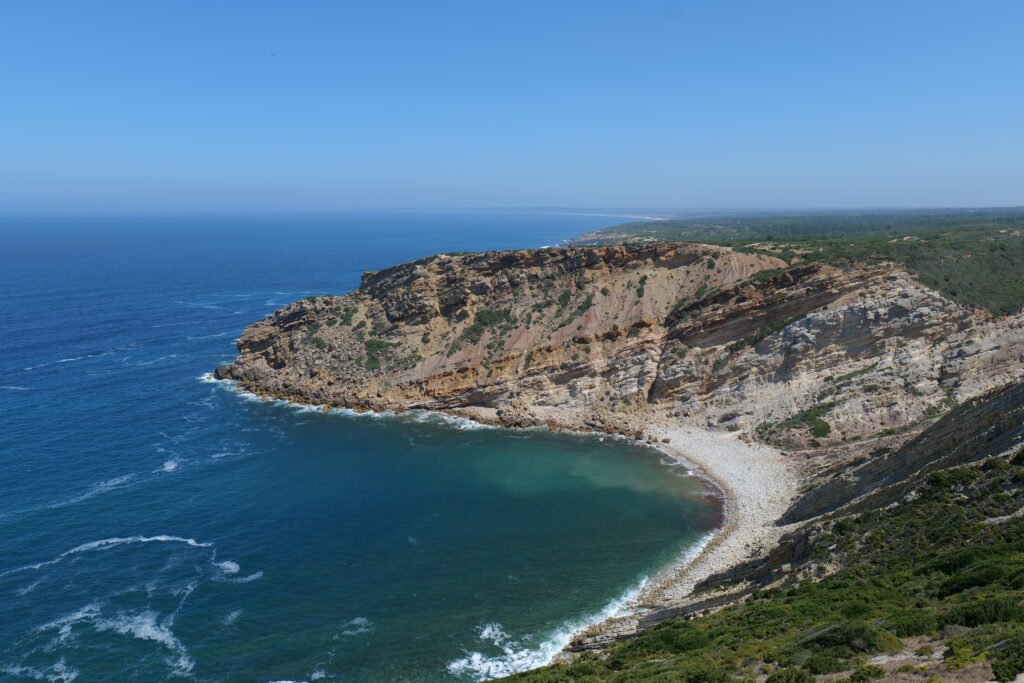
Is English Spoken in Portugal?
Yes! English is widely spoken in Portugal, especially in tourist towns/cities, and in hotels, restaurants and attractions. Most younger locals and people working in hospitality also speak good English and are used to communicating with travellers.
However, in smaller towns or rural communities, you’ll find fewer fluent English speakers – although most people will still try their best to help you if you need it!
Even though English is widely spoken, learning a few Portuguese basics will go a long way! A simple “Olá” (which means hello) or “Obrigada” (which means thank you), is always appreciated and shows respect for the local culture. Portuguese people are warm and welcoming and they won’t expect you to be fluent, but I’ve found that making an effort really enhances the travel experience!
Katie’s Top Tip: Download the Google Translate app and download Portuguese offline. It’s great when you’re reading menus, catching trains or needing help with communication in non-touristy areas!
Is Public Transport Safe and Reliable in Portugal?
Public transport in Portugal is not just safe – it’s actually one of the best ways to get around, especially for solo travellers!
The train network is clean, punctual and affordable, making it easy to travel between bigger cities like Lisbon, Porto and Coimbra. Buses also run frequently between both cities and rural towns. As a solo female traveller in Portugal, I’ve taken both local trams and buses and cross-country buses and always felt completely safe and comfortable.
Having said that, public transport does come with some familiar cautions: watch your bag on busy bus or tram services, avoid sitting in empty train carriages late at night and if you’re ever unsure about your stop, don’t be afraid to ask someone for help.
It’s also good idea to avoid the final train or bus of the night and plan your route in advance so you know what you’re doing ahead of time.
Katie’s Top Tip: If you’re using public transport in Lisbon or Porto, grab a rechargeable travel card (in Lisbon, this is called Viva Viagem, whereas in Porto, this is called Andante), to make your journey smoother and cheaper. And try to sit near the guard/driver, other women or families if you’re travelling late, for extra peace of mind.
Top Solo Female Travel Safety Tips for Portugal
So, is Portugal safe for solo female travellers? Generally, yes – but that doesn’t mean you should let your guard down completely during your trip. My top tips?
- Choose well-reviewed accommodation in central, well-lit areas. Bonus points if there are good reviews from other solo travellers!
- Always have a way to get home at night. Saving the number of a trusted taxi service or downloading a ride app is your solo travel BFF here.
- Keep valuables close to the front of your body – especially in crowded spots like transport hubs and major tourist attractions.
- When you’re out exploring, carry yourself with confidence – even if you have to fake it! Confidence is a huge part of safety when travelling solo.
- And finally, most importantly, don’t forget to trust your gut. If something doesn’t feel right, get out of there. You don’t need to be polite or apologise. Your comfort and safety comes first.
So, Is Portugal Safe for Solo Female Travellers?
Yes, Portugal is generally safe for solo female travellers. In fact, it’s one of the safest and most welcoming countries in Europe, according to the Global Peace Index.
With low crime rates, kind and helpful locals, reliable public transport and a popular solo travel scene, Portugal makes it incredibly easy to get out and explore on your own terms – whether you’re after a rural adventure, a city break, a beach getaway, or just some peace and quiet.
Like any country, Portugal is not without its solo female travel safety challenges. (You’ll still need to stay aware of scams, pickpockets and late-night safety – especially in busy cities and during peak season). But with the right preparation and a few smart solo female travel safety habits, Portugal is a great country to travel solo as a woman!
And if you’re still feeling nervous? It’s more than okay to start small.
Book a long weekend in central Lisbon or Porto, sign up for a guided day tour or two so you’re not exploring alone, and give yourself permission to stick within your comfort zone.
Solo travel confidence isn’t something automatic – it’s built with every city walk, meal for one and sunset watched alone. And Portugal is the perfect place to experience all of that and more!
Have you ever visited Portugal? Where is on your must-see list? Let me know in the comments!
Read More About Solo Travel in Portugal:
- Is Porto Safe For Solo Female Travellers? Porto Safety Tips
- How to Spend 3 Days in Porto: Your Perfect Porto Itinerary
- The 7 Best Day Trips From Porto (No Car Needed!)
- 17 Best Things To Do Alone in Lisbon For Solo Travellers
- 11 Best Day Trips from Lisbon You’ll Wish You Knew Sooner
Grab Your Solo Female Travel in Europe Starter Kit:
Pin Me For Later!
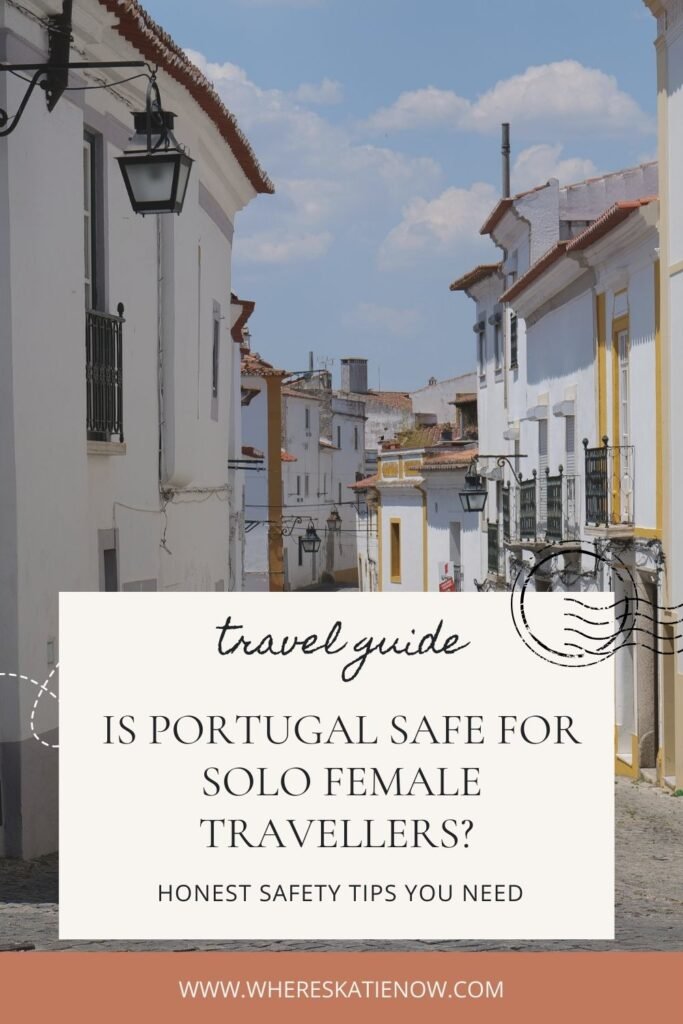
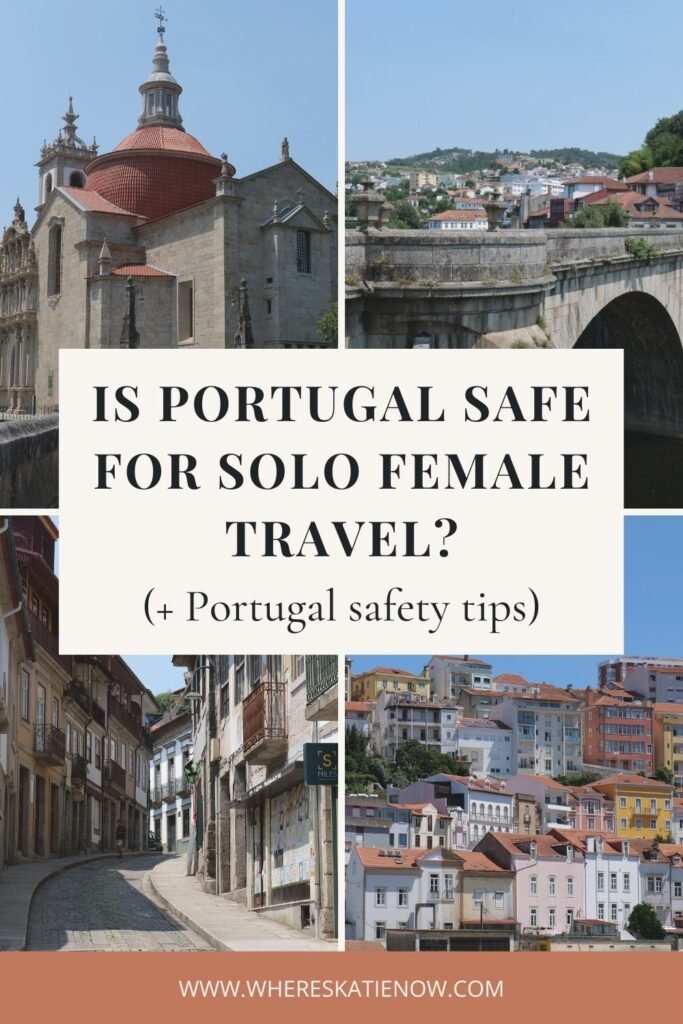
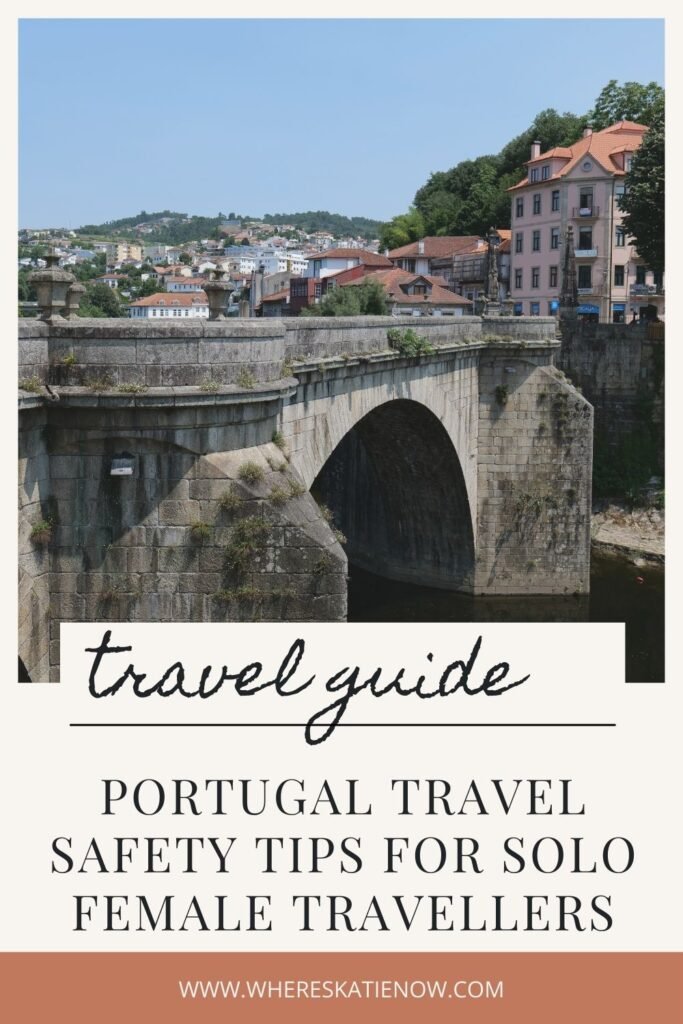

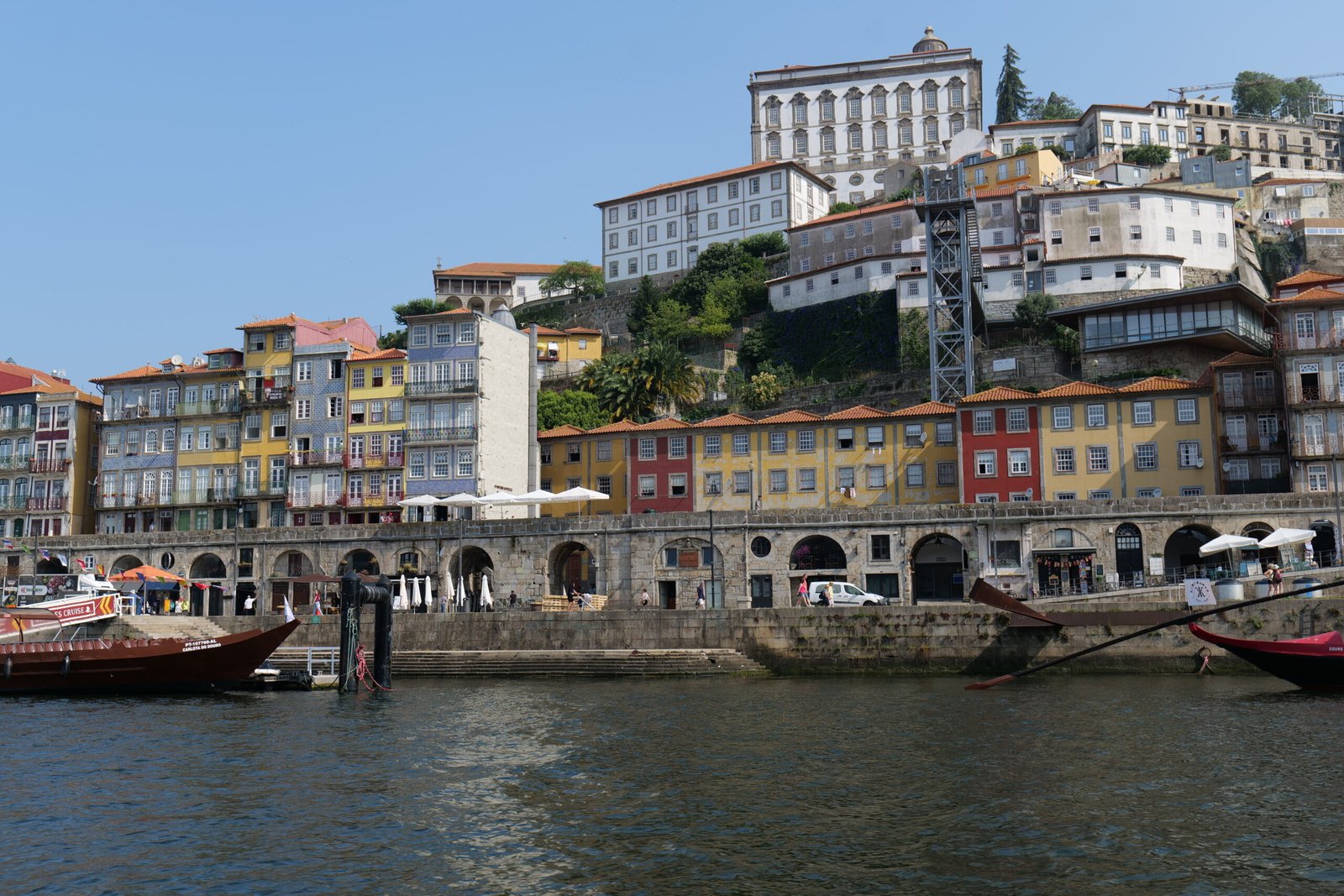
3 Comments